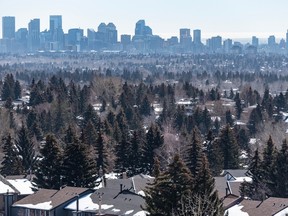
Article content
Adopting the concept of blanket rezoning could change the nature of our community forever, and not in a good way.
I grew up in Roxboro. My parents bought their house when the community was developed in the 1920s. They were not wealthy, and the investment in their house at that time was the most significant investment they ever made.
Article content
I went to the neighbourhood public school, Rideau Park, for nine years and made friends with kids, not only from Rideau-Roxboro, but also from the neighbouring communities of Mission, Erlton and Park Hill.
Advertisement 2
Article content
Because of the wonderful character of this special neighbourhood, my wife and I bought our house in Roxboro, two blocks from where I grew up, in the 1970s. We raised our three children in Roxboro and still live on the same lot but in a new house that we had to build, as we lost our original home in the 2013 flood. Our children also went to Rideau Park School for nine years and made friends with kids from our neighbourhood as well as the surrounding communities.
Shortly after we bought our house in the 1970s, a new purchaser of the house across the street began efforts to subdivide his lot and build an infill house on 25 feet of his 75-foot lot.
We fought this proposed development with the support of the community association, on the basis that it would change the character of the historical neighbourhood; several mature trees would have to be removed; and open, green space would be reduced. As well, it would be a precedent for other developments that would forever change the nature of our community and similar R1 communities across the city.
The council of the day not only refused the development permit, but Alderman Barb Scott advanced a motion, which was approved, preventing infill developments in all R1 zoned districts in Calgary. The primary basis for this was the threat to the character of historic neighbourhoods, the removal of mature trees and limiting open spaces. There was recognition that citizens have made perhaps the most significant investment of their lives in these communities and policy changes should not threaten that investment.
Advertisement 3
Article content
Our city is faced with this same threat today. The issues are the same – the character of historic communities, removal of mature trees, and reduction of open spaces. But in our growing city, one must also consider pressures on parking, road and transportation systems, overcrowding schools, inadequate parks and green spaces, etc.
Previous city planners have done a fine job of creating a matrix of communities that respond to the needs of Calgarians. Our ward includes many neighbourhoods that offer a variety of housing options that suit different budgets – in fact only 18 per cent of the housing offered is single-family dwellings. Market factors dictate what is affordable depending on economic circumstances, which is as it should be.
I recognize the need for more housing options, including affordable housing, but development of multi-family residences in Rideau-Roxboro, or other similar communities, will not meet the definition of affordable housing. The focus of the City should be on freeing up some of its significant land holdings for housing and reducing red tape so housing developments (in appropriately zoned areas) can proceed to construction without the interminable delays that have unfortunately existed at our City Hall for as long as I can remember.
The question of blanket rezoning is a momentous one, and one that should be open to all Calgarians to decide. I hope city council won’t turn their backs on the people that elected them and pay their salaries. In good conscience, they should allow blanket rezoning to go to a public plebiscite.
Steve Allan is a community leader in Calgary and concerned citizen.
Article content



